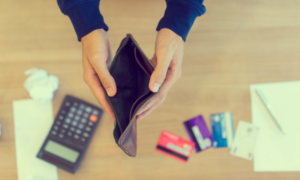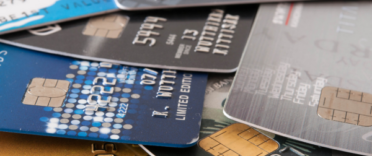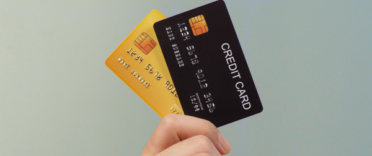 When you use a credit card you are, in effect, borrowing money from the credit card provider. As with anything you borrow, you will need to give it back. Your provider will issue a monthly bill and you will have the option of paying the balance in full – and avoiding having to pay any interest – or paying part of the outstanding balance. You will be told what the minimum repayment is and the deadline for making that payment. This means that in an ideal world, everyone would make their credit card payments on time and in full. However, it is worth knowing the potential consequences if you are late making a payment or consistently miss multiple payments. In this article we will explain what can happen if you can't pay your credit card bills, plus the best ways to deal with your debt.
When you use a credit card you are, in effect, borrowing money from the credit card provider. As with anything you borrow, you will need to give it back. Your provider will issue a monthly bill and you will have the option of paying the balance in full – and avoiding having to pay any interest – or paying part of the outstanding balance. You will be told what the minimum repayment is and the deadline for making that payment. This means that in an ideal world, everyone would make their credit card payments on time and in full. However, it is worth knowing the potential consequences if you are late making a payment or consistently miss multiple payments. In this article we will explain what can happen if you can't pay your credit card bills, plus the best ways to deal with your debt.
What happens if I miss a payment on my credit card?
Usually, missing the deadline for making the minimum repayment will mean you face some kind of charge or penalty from your provider. The penalty you are likely to receive becomes more severe as time goes on and your missed payment becomes increasingly late. Although there isn't a set template for what action the credit card company will take, the table below gives an indication of what to expect:
| Payment is late by | Potential action taken by credit card company |
| 1 day | Charge a late fee
End any promotional offer |
| 30 days |
Report the late payment to credit reference agencies Equifax, Experian and TransUnion, leaving a mark on your credit file
|
| 60 days | Charge a higher penalty APR to the balance owed |
| 90-150 days |
Periodically report the continued late payments to credit bureaus
|
| 180 days |
Close account and pass on to a debt collection agency
|
There is a risk at any point that the credit card company could take you to court to try to recoup the unpaid debt. This could result in a County Court Judgement (CCJ) and possibly a court order stating that the company can take the money directly from your pay cheque or bank account. In some cases, bailiffs will be instructed to seize goods to cover the value of the outstanding amount.
What happens to my credit rating if I miss a credit card payment?
A one-off late payment that is delayed by a day or two is not always reported to credit agencies, but persistent late payments or those that exceed a month are likely to be included on your credit file with the main credit bureaus. Late payments stay on your file for seven years, although they have the greatest impact on your credit score when they first appear on your report. Your credit score will generally strengthen again over time if you demonstrate responsible financial management.
Your credit score is important as it indicates whether you will be accepted for future borrowing, including mortgages, car finance and personal loans. You can find out more about how to improve your credit score in our article 'How to improve your credit score quickly'.
Will the promotional offer on my credit card stop?
While credit card companies are keen to attract new customers by offering extended interest-free periods on purchases, balance transfers and money transfers, a condition of these offers is that the borrower keeps up with at least the minimum monthly repayment. Therefore, if you are late or miss even one payment, the offer can be revoked. This can have serious implications if you have a sizeable balance on the card as you will be automatically moved to the standard APR, which could result in hundreds of pounds of unexpected interest payments.
If you are unsure how the APR on your card affects your repayments, read our article 'What is representative APR?'.
To avoid missing a payment, consider setting up a direct debit so that the payment happens automatically each month. If you know you are unlikely to be able to make the late payment, contact the credit card company as soon as possible to try to work out a solution that will enable you to continue to benefit from the introductory interest-free rate.
What happens if I don't pay my credit card bill?
UK credit card providers will always set a minimum monthly payment. If your circumstances have changed and you are struggling to keep up with your current repayments, first consider if you can afford to make the minimum monthly payment required by the credit card company. Try to meet this minimum requirement to avoid incurring additional fees and damaging your credit score, without sacrificing payments on essentials like rent or food. We explain more about the minimum payment in our article 'What is the minimum payment on a credit card?'.
If you are unable to make any payment on your credit card, look at the following options:
- Speak to your credit card company
- Explore whether you can move your credit card debt to another card with an interest-free offer. This could give you valuable breathing space and allow you to work out a longer term solution to your problems. You can read more in our article 'What is a balance transfer credit card and how does it work?'.
- Consider a personal loan, which could be used to pay off your credit card debt, meaning you are borrowing with a significantly lower interest rate. It may also help to pay off the debt quicker as most loans have a fixed repayment amount as well as a fixed term. we have more information in our article 'Is it better to get a credit card or a personal loan?'.
As we said above, there are many sources of free debt advice, including the Citizens' Advice Bureau and debt charity Step Change. The key is to be proactive and tackle the issue as early as possible to avoid becoming consumed with growing debts and fees.
What is 'persistent' debt?
The definition of 'persistent' debt is paying more in interest and charges than on repaying your original credit card debt over an 18-month period. This may be caused by making a number of late payments or missing payments, but can also be down to only making the minimum repayment each month. This can have the effect of spreading the debt over years, leading to you paying significantly more in interest than the value of the original debt.
Credit card companies are obliged to inform you if you have persistent debt and offer suggestions on how you could clear the debt faster. This could be by suggesting a new repayment schedule. However, if you don't engage with them, you could have your card suspended. If you find yourself in this situation, it is always advisable to face up to it, communicate with your creditors and seek advice. There are more details of where to get help in our article 'Where to get free debt advice'.
Can I get my credit card debt written off?
Looking to get your credit card debt written off is a major decision as it involves insolvency options such as bankruptcy, debt relief orders or Individual Voluntary Arrangements (IVA's). These will have a big impact on your credit file, with potential long-term damage. There can also be fees associated with using these debt solutions, as well as a potential risk of losing assets such as your home or car if you have secured debt.
Before deciding to take this course of action, it is highly advisable to seek high-quality impartial advice and to consider what other options may be available to you. You should also be wary of any firms that promise they can get your debts written off by exploiting legal loopholes as they are, at best, misleading and could end up worsening your financial position.
If you are struggling with multiple debts, you could consider debt consolidation. Read our article 'What is the best way to consolidate my debt?' to learn more.
How do I pay off my credit card debt?
There are four key principles to paying off credit card debt: pay more than the minimum, prioritise high-interest debt, budget around your repayments and consider balance transfer credit cards. We go into more detail in our article '4 easy ways to clear your credit card debt'.





